Managing Data & Information: Mathematical Calculations Task Solution
VerifiedAdded on 2023/06/18
|13
|1815
|438
Homework Assignment
AI Summary
This assignment focuses on mathematical calculations related to managing data and information. It includes tasks such as basic arithmetic operations, solving equations, applying BODMAS rules, and calculating combinations. The solution provides step-by-step explanations for each calculation, including examples involving square roots, fractions, and algebraic expressions. It also addresses practical problems like calculating time, monthly payments, and perimeters. Furthermore, the assignment covers solving linear equations, determining gradients, and formulating equations based on given conditions. It concludes with problems involving multiple variables and time management in production and assembly departments. Desklib offers this and other solved assignments to aid students in their studies.

Managing Data And
Information
Information
Paraphrase This Document
Need a fresh take? Get an instant paraphrase of this document with our AI Paraphraser
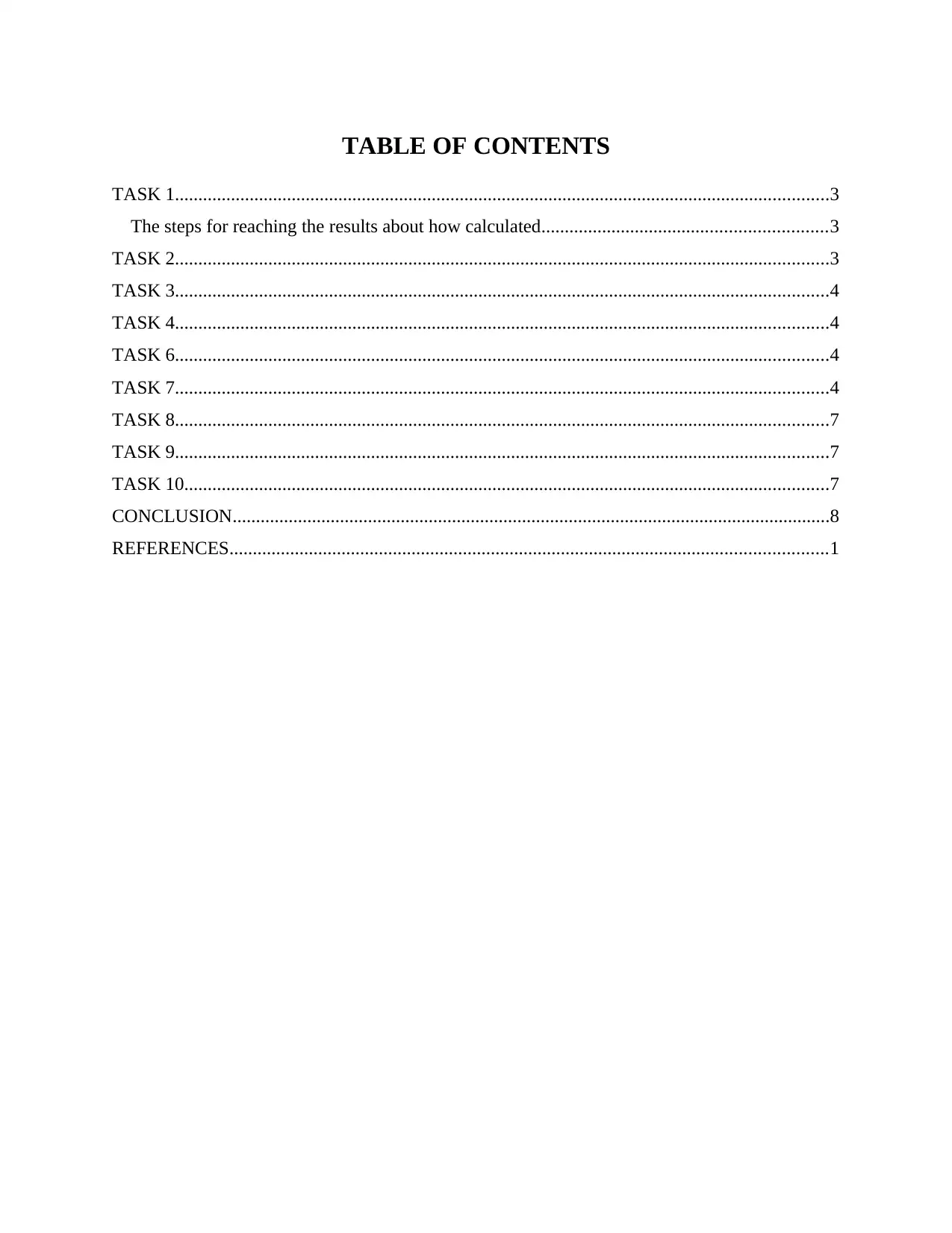
TABLE OF CONTENTS
TASK 1............................................................................................................................................3
The steps for reaching the results about how calculated.............................................................3
TASK 2............................................................................................................................................3
TASK 3............................................................................................................................................4
TASK 4............................................................................................................................................4
TASK 6............................................................................................................................................4
TASK 7............................................................................................................................................4
TASK 8............................................................................................................................................7
TASK 9............................................................................................................................................7
TASK 10..........................................................................................................................................7
CONCLUSION................................................................................................................................8
REFERENCES................................................................................................................................1
TASK 1............................................................................................................................................3
The steps for reaching the results about how calculated.............................................................3
TASK 2............................................................................................................................................3
TASK 3............................................................................................................................................4
TASK 4............................................................................................................................................4
TASK 6............................................................................................................................................4
TASK 7............................................................................................................................................4
TASK 8............................................................................................................................................7
TASK 9............................................................................................................................................7
TASK 10..........................................................................................................................................7
CONCLUSION................................................................................................................................8
REFERENCES................................................................................................................................1
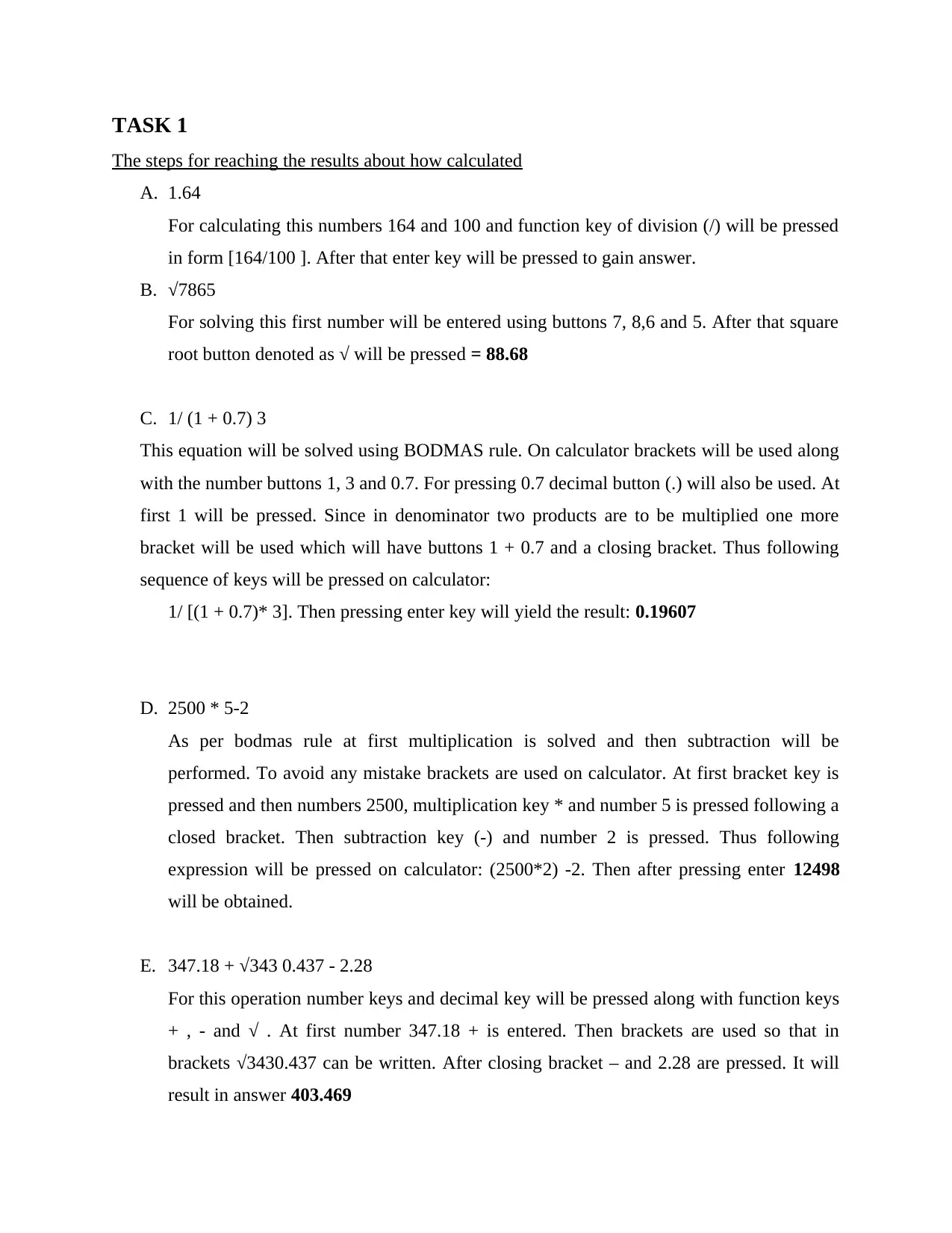
TASK 1
The steps for reaching the results about how calculated
A. 1.64
For calculating this numbers 164 and 100 and function key of division (/) will be pressed
in form [164/100 ]. After that enter key will be pressed to gain answer.
B. √7865
For solving this first number will be entered using buttons 7, 8,6 and 5. After that square
root button denoted as √ will be pressed = 88.68
C. 1/ (1 + 0.7) 3
This equation will be solved using BODMAS rule. On calculator brackets will be used along
with the number buttons 1, 3 and 0.7. For pressing 0.7 decimal button (.) will also be used. At
first 1 will be pressed. Since in denominator two products are to be multiplied one more
bracket will be used which will have buttons 1 + 0.7 and a closing bracket. Thus following
sequence of keys will be pressed on calculator:
1/ [(1 + 0.7)* 3]. Then pressing enter key will yield the result: 0.19607
D. 2500 * 5-2
As per bodmas rule at first multiplication is solved and then subtraction will be
performed. To avoid any mistake brackets are used on calculator. At first bracket key is
pressed and then numbers 2500, multiplication key * and number 5 is pressed following a
closed bracket. Then subtraction key (-) and number 2 is pressed. Thus following
expression will be pressed on calculator: (2500*2) -2. Then after pressing enter 12498
will be obtained.
E. 347.18 + √343 0.437 - 2.28
For this operation number keys and decimal key will be pressed along with function keys
+ , - and √ . At first number 347.18 + is entered. Then brackets are used so that in
brackets √3430.437 can be written. After closing bracket – and 2.28 are pressed. It will
result in answer 403.469
The steps for reaching the results about how calculated
A. 1.64
For calculating this numbers 164 and 100 and function key of division (/) will be pressed
in form [164/100 ]. After that enter key will be pressed to gain answer.
B. √7865
For solving this first number will be entered using buttons 7, 8,6 and 5. After that square
root button denoted as √ will be pressed = 88.68
C. 1/ (1 + 0.7) 3
This equation will be solved using BODMAS rule. On calculator brackets will be used along
with the number buttons 1, 3 and 0.7. For pressing 0.7 decimal button (.) will also be used. At
first 1 will be pressed. Since in denominator two products are to be multiplied one more
bracket will be used which will have buttons 1 + 0.7 and a closing bracket. Thus following
sequence of keys will be pressed on calculator:
1/ [(1 + 0.7)* 3]. Then pressing enter key will yield the result: 0.19607
D. 2500 * 5-2
As per bodmas rule at first multiplication is solved and then subtraction will be
performed. To avoid any mistake brackets are used on calculator. At first bracket key is
pressed and then numbers 2500, multiplication key * and number 5 is pressed following a
closed bracket. Then subtraction key (-) and number 2 is pressed. Thus following
expression will be pressed on calculator: (2500*2) -2. Then after pressing enter 12498
will be obtained.
E. 347.18 + √343 0.437 - 2.28
For this operation number keys and decimal key will be pressed along with function keys
+ , - and √ . At first number 347.18 + is entered. Then brackets are used so that in
brackets √3430.437 can be written. After closing bracket – and 2.28 are pressed. It will
result in answer 403.469
⊘ This is a preview!⊘
Do you want full access?
Subscribe today to unlock all pages.

Trusted by 1+ million students worldwide
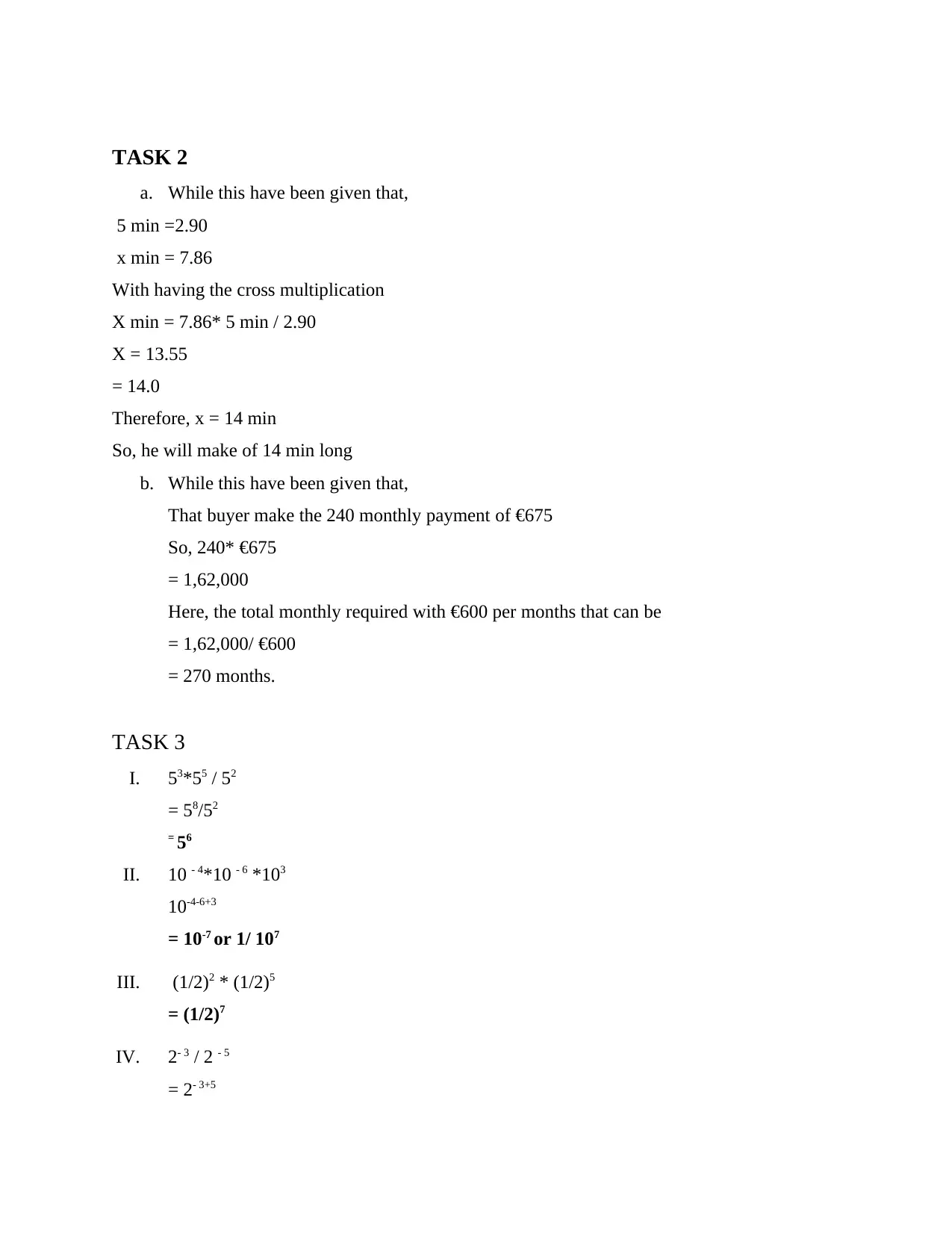
TASK 2
a. While this have been given that,
5 min =2.90
x min = 7.86
With having the cross multiplication
X min = 7.86* 5 min / 2.90
X = 13.55
= 14.0
Therefore, x = 14 min
So, he will make of 14 min long
b. While this have been given that,
That buyer make the 240 monthly payment of €675
So, 240* €675
= 1,62,000
Here, the total monthly required with €600 per months that can be
= 1,62,000/ €600
= 270 months.
TASK 3
I. 53*55 / 52
= 58/52
= 56
II. 10 - 4*10 - 6 *103
10-4-6+3
= 10-7 or 1/ 107
III. (1/2)2 * (1/2)5
= (1/2)7
IV. 2- 3 / 2 - 5
= 2- 3+5
a. While this have been given that,
5 min =2.90
x min = 7.86
With having the cross multiplication
X min = 7.86* 5 min / 2.90
X = 13.55
= 14.0
Therefore, x = 14 min
So, he will make of 14 min long
b. While this have been given that,
That buyer make the 240 monthly payment of €675
So, 240* €675
= 1,62,000
Here, the total monthly required with €600 per months that can be
= 1,62,000/ €600
= 270 months.
TASK 3
I. 53*55 / 52
= 58/52
= 56
II. 10 - 4*10 - 6 *103
10-4-6+3
= 10-7 or 1/ 107
III. (1/2)2 * (1/2)5
= (1/2)7
IV. 2- 3 / 2 - 5
= 2- 3+5
Paraphrase This Document
Need a fresh take? Get an instant paraphrase of this document with our AI Paraphraser
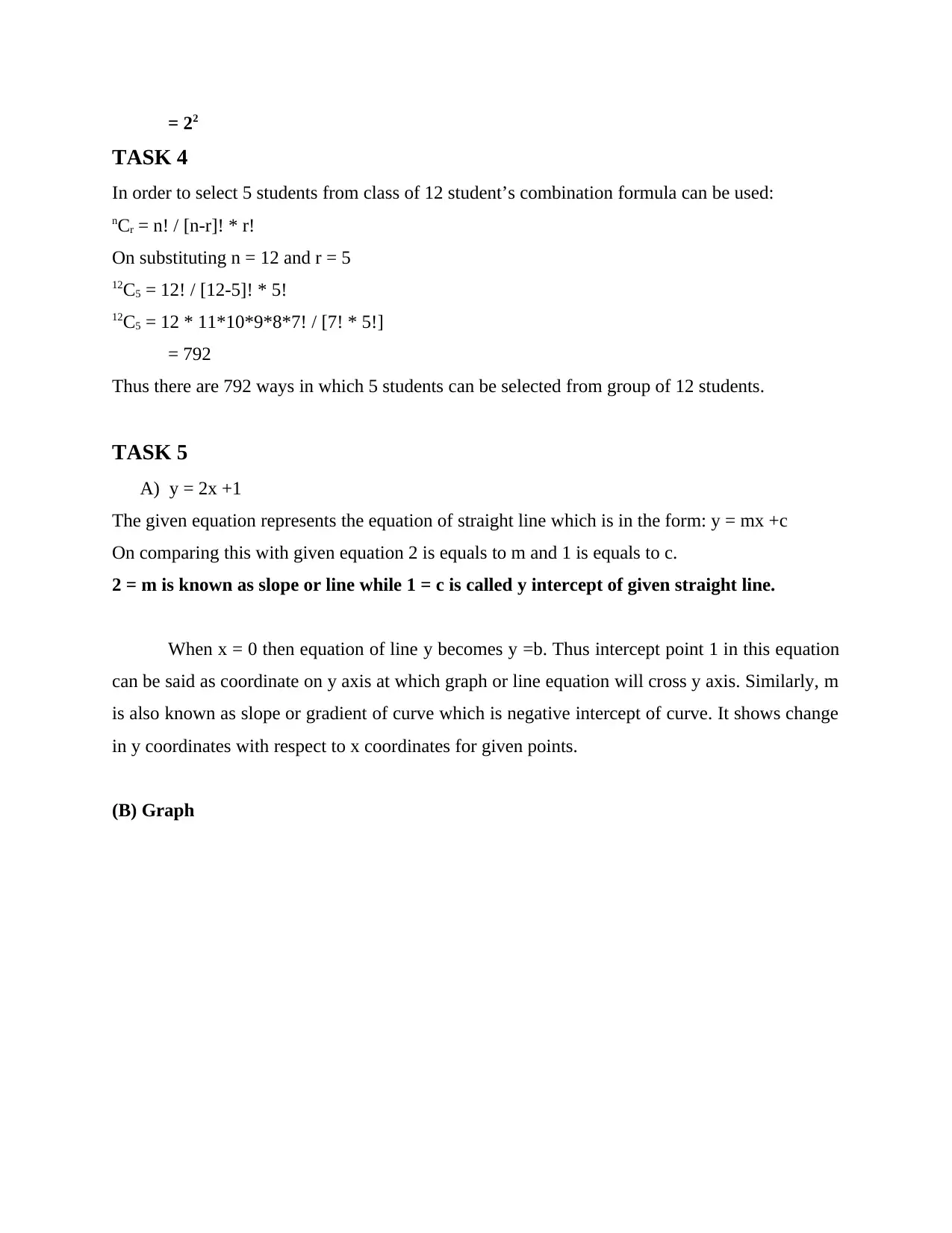
= 22
TASK 4
In order to select 5 students from class of 12 student’s combination formula can be used:
nCr = n! / [n-r]! * r!
On substituting n = 12 and r = 5
12C5 = 12! / [12-5]! * 5!
12C5 = 12 * 11*10*9*8*7! / [7! * 5!]
= 792
Thus there are 792 ways in which 5 students can be selected from group of 12 students.
TASK 5
A) y = 2x +1
The given equation represents the equation of straight line which is in the form: y = mx +c
On comparing this with given equation 2 is equals to m and 1 is equals to c.
2 = m is known as slope or line while 1 = c is called y intercept of given straight line.
When x = 0 then equation of line y becomes y =b. Thus intercept point 1 in this equation
can be said as coordinate on y axis at which graph or line equation will cross y axis. Similarly, m
is also known as slope or gradient of curve which is negative intercept of curve. It shows change
in y coordinates with respect to x coordinates for given points.
(B) Graph
TASK 4
In order to select 5 students from class of 12 student’s combination formula can be used:
nCr = n! / [n-r]! * r!
On substituting n = 12 and r = 5
12C5 = 12! / [12-5]! * 5!
12C5 = 12 * 11*10*9*8*7! / [7! * 5!]
= 792
Thus there are 792 ways in which 5 students can be selected from group of 12 students.
TASK 5
A) y = 2x +1
The given equation represents the equation of straight line which is in the form: y = mx +c
On comparing this with given equation 2 is equals to m and 1 is equals to c.
2 = m is known as slope or line while 1 = c is called y intercept of given straight line.
When x = 0 then equation of line y becomes y =b. Thus intercept point 1 in this equation
can be said as coordinate on y axis at which graph or line equation will cross y axis. Similarly, m
is also known as slope or gradient of curve which is negative intercept of curve. It shows change
in y coordinates with respect to x coordinates for given points.
(B) Graph
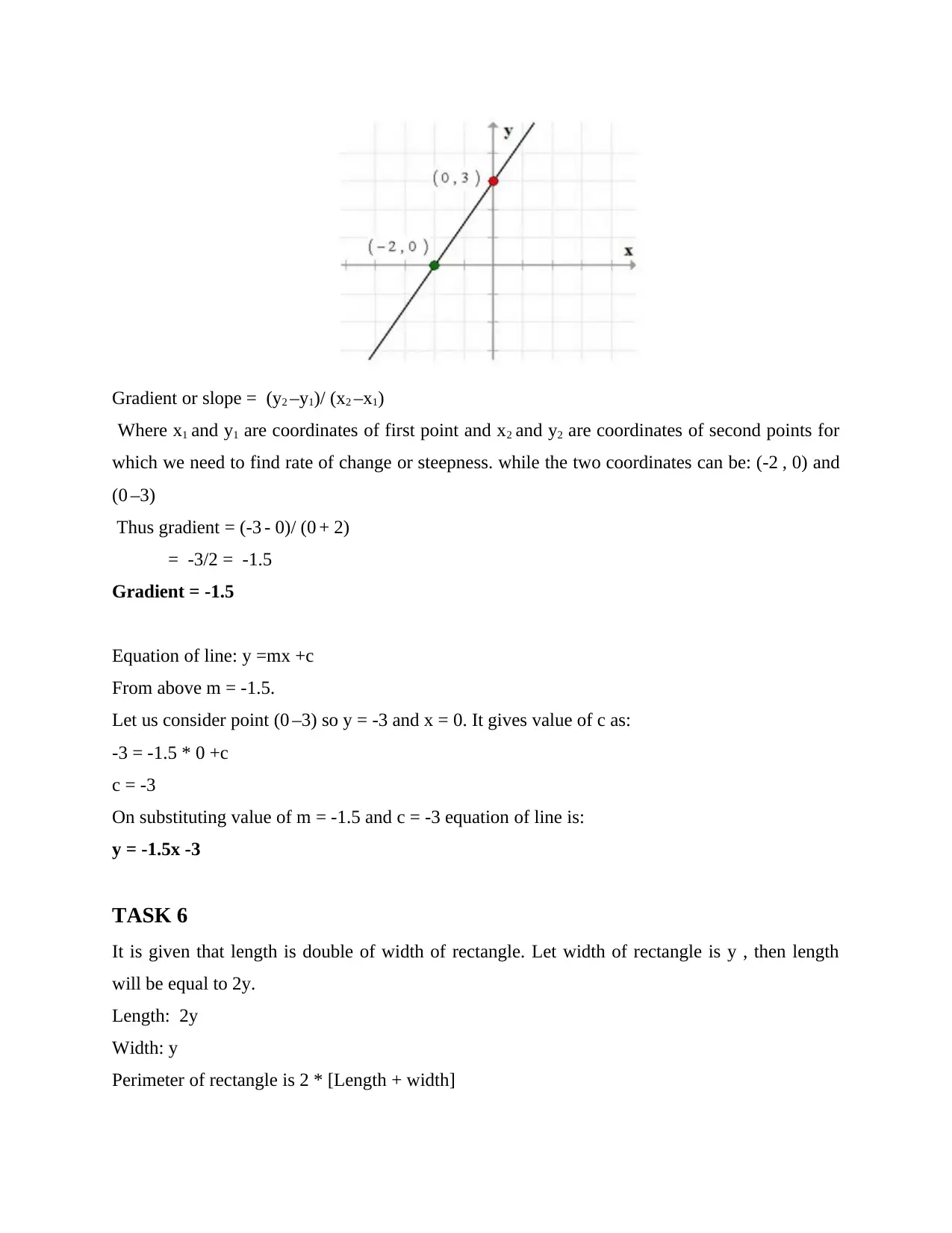
Gradient or slope = (y2 –y1)/ (x2 –x1)
Where x1 and y1 are coordinates of first point and x2 and y2 are coordinates of second points for
which we need to find rate of change or steepness. while the two coordinates can be: (-2 , 0) and
(0 –3)
Thus gradient = (-3 - 0)/ (0 + 2)
= -3/2 = -1.5
Gradient = -1.5
Equation of line: y =mx +c
From above m = -1.5.
Let us consider point (0 –3) so y = -3 and x = 0. It gives value of c as:
-3 = -1.5 * 0 +c
c = -3
On substituting value of m = -1.5 and c = -3 equation of line is:
y = -1.5x -3
TASK 6
It is given that length is double of width of rectangle. Let width of rectangle is y , then length
will be equal to 2y.
Length: 2y
Width: y
Perimeter of rectangle is 2 * [Length + width]
Where x1 and y1 are coordinates of first point and x2 and y2 are coordinates of second points for
which we need to find rate of change or steepness. while the two coordinates can be: (-2 , 0) and
(0 –3)
Thus gradient = (-3 - 0)/ (0 + 2)
= -3/2 = -1.5
Gradient = -1.5
Equation of line: y =mx +c
From above m = -1.5.
Let us consider point (0 –3) so y = -3 and x = 0. It gives value of c as:
-3 = -1.5 * 0 +c
c = -3
On substituting value of m = -1.5 and c = -3 equation of line is:
y = -1.5x -3
TASK 6
It is given that length is double of width of rectangle. Let width of rectangle is y , then length
will be equal to 2y.
Length: 2y
Width: y
Perimeter of rectangle is 2 * [Length + width]
⊘ This is a preview!⊘
Do you want full access?
Subscribe today to unlock all pages.

Trusted by 1+ million students worldwide
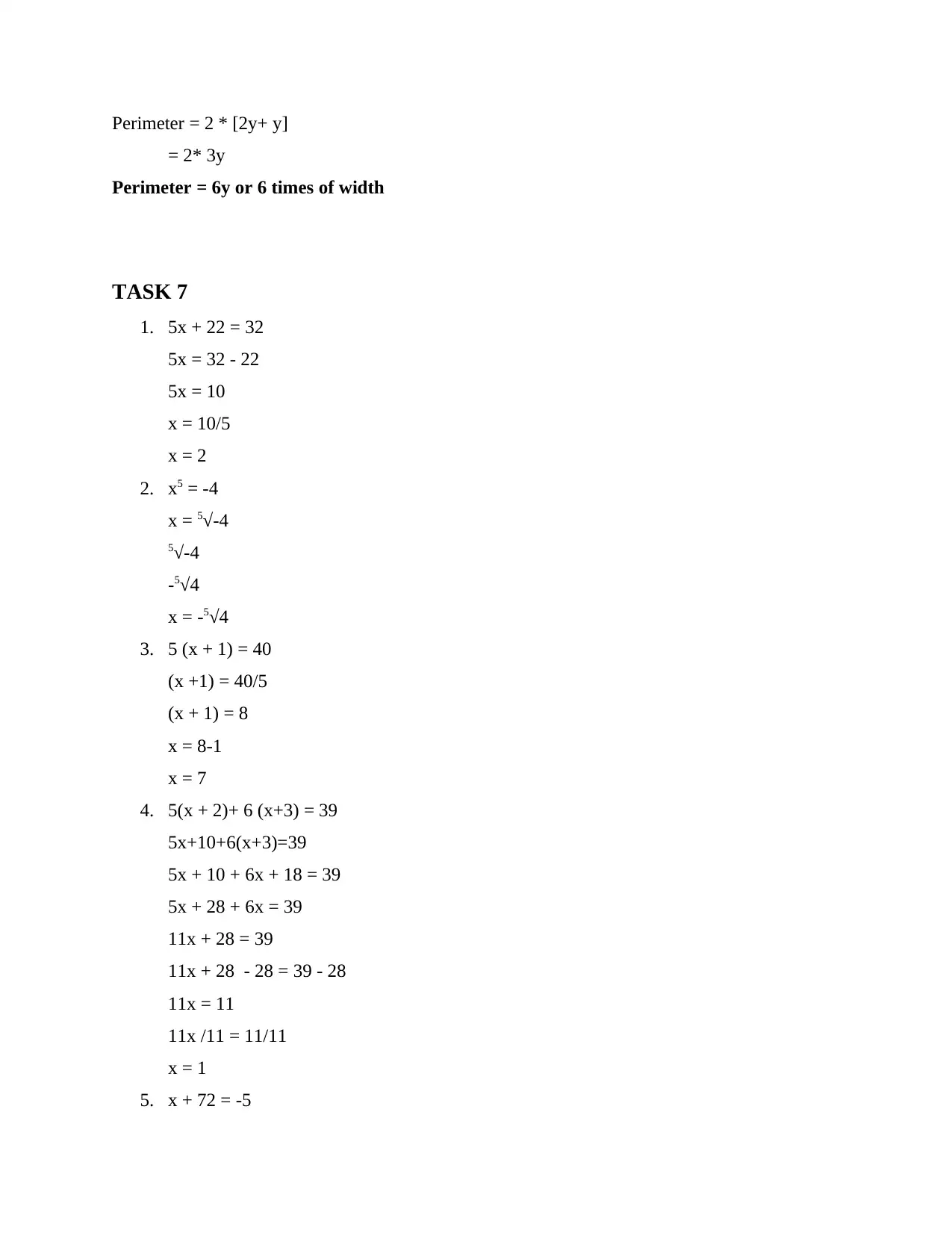
Perimeter = 2 * [2y+ y]
= 2* 3y
Perimeter = 6y or 6 times of width
TASK 7
1. 5x + 22 = 32
5x = 32 - 22
5x = 10
x = 10/5
x = 2
2. x5 = -4
x = 5√-4
5√-4
-5√4
x = -5√4
3. 5 (x + 1) = 40
(x +1) = 40/5
(x + 1) = 8
x = 8-1
x = 7
4. 5(x + 2)+ 6 (x+3) = 39
5x+10+6(x+3)=39
5x + 10 + 6x + 18 = 39
5x + 28 + 6x = 39
11x + 28 = 39
11x + 28 - 28 = 39 - 28
11x = 11
11x /11 = 11/11
x = 1
5. x + 72 = -5
= 2* 3y
Perimeter = 6y or 6 times of width
TASK 7
1. 5x + 22 = 32
5x = 32 - 22
5x = 10
x = 10/5
x = 2
2. x5 = -4
x = 5√-4
5√-4
-5√4
x = -5√4
3. 5 (x + 1) = 40
(x +1) = 40/5
(x + 1) = 8
x = 8-1
x = 7
4. 5(x + 2)+ 6 (x+3) = 39
5x+10+6(x+3)=39
5x + 10 + 6x + 18 = 39
5x + 28 + 6x = 39
11x + 28 = 39
11x + 28 - 28 = 39 - 28
11x = 11
11x /11 = 11/11
x = 1
5. x + 72 = -5
Paraphrase This Document
Need a fresh take? Get an instant paraphrase of this document with our AI Paraphraser
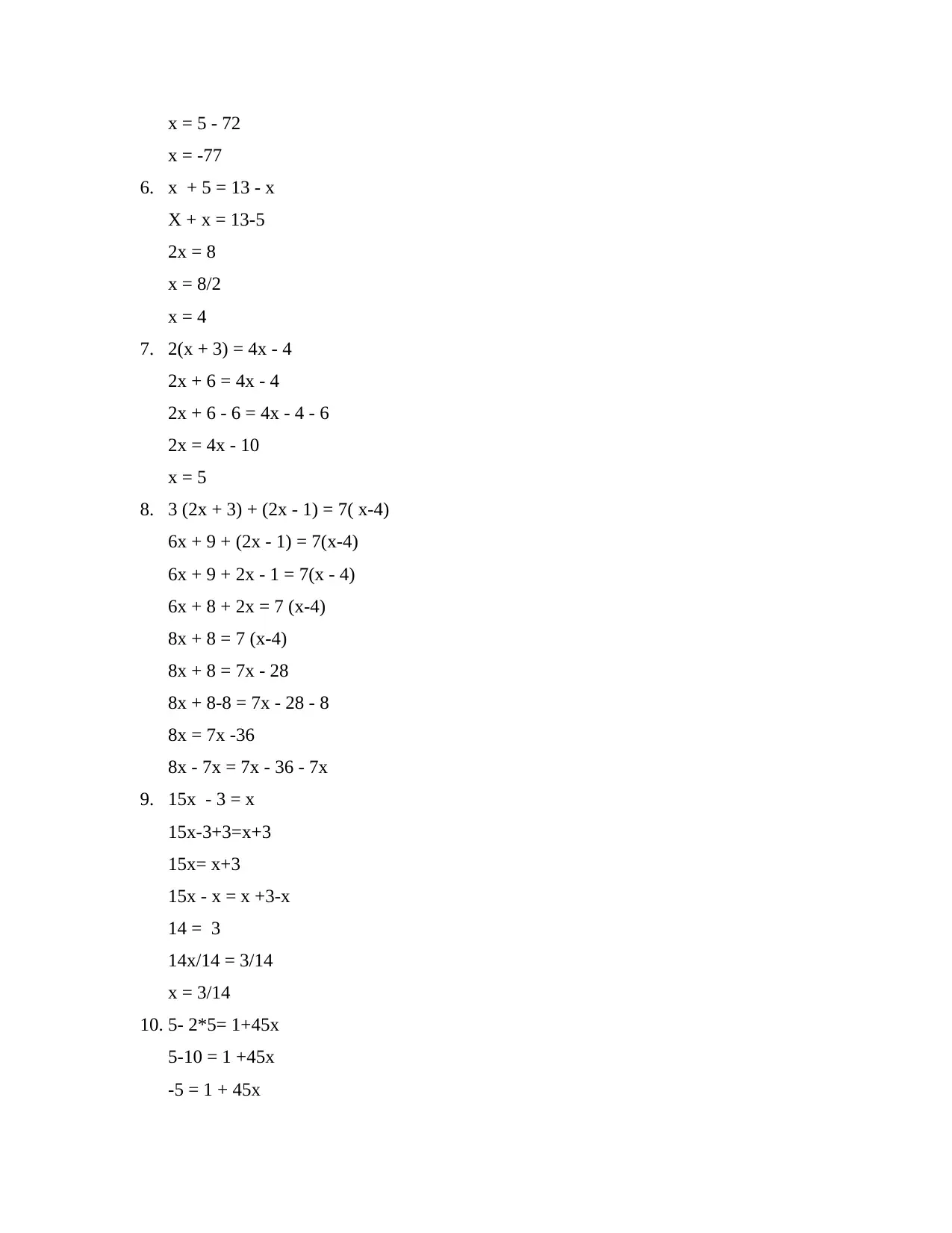
x = 5 - 72
x = -77
6. x + 5 = 13 - x
X + x = 13-5
2x = 8
x = 8/2
x = 4
7. 2(x + 3) = 4x - 4
2x + 6 = 4x - 4
2x + 6 - 6 = 4x - 4 - 6
2x = 4x - 10
x = 5
8. 3 (2x + 3) + (2x - 1) = 7( x-4)
6x + 9 + (2x - 1) = 7(x-4)
6x + 9 + 2x - 1 = 7(x - 4)
6x + 8 + 2x = 7 (x-4)
8x + 8 = 7 (x-4)
8x + 8 = 7x - 28
8x + 8-8 = 7x - 28 - 8
8x = 7x -36
8x - 7x = 7x - 36 - 7x
9. 15x - 3 = x
15x-3+3=x+3
15x= x+3
15x - x = x +3-x
14 = 3
14x/14 = 3/14
x = 3/14
10. 5- 2*5= 1+45x
5-10 = 1 +45x
-5 = 1 + 45x
x = -77
6. x + 5 = 13 - x
X + x = 13-5
2x = 8
x = 8/2
x = 4
7. 2(x + 3) = 4x - 4
2x + 6 = 4x - 4
2x + 6 - 6 = 4x - 4 - 6
2x = 4x - 10
x = 5
8. 3 (2x + 3) + (2x - 1) = 7( x-4)
6x + 9 + (2x - 1) = 7(x-4)
6x + 9 + 2x - 1 = 7(x - 4)
6x + 8 + 2x = 7 (x-4)
8x + 8 = 7 (x-4)
8x + 8 = 7x - 28
8x + 8-8 = 7x - 28 - 8
8x = 7x -36
8x - 7x = 7x - 36 - 7x
9. 15x - 3 = x
15x-3+3=x+3
15x= x+3
15x - x = x +3-x
14 = 3
14x/14 = 3/14
x = 3/14
10. 5- 2*5= 1+45x
5-10 = 1 +45x
-5 = 1 + 45x
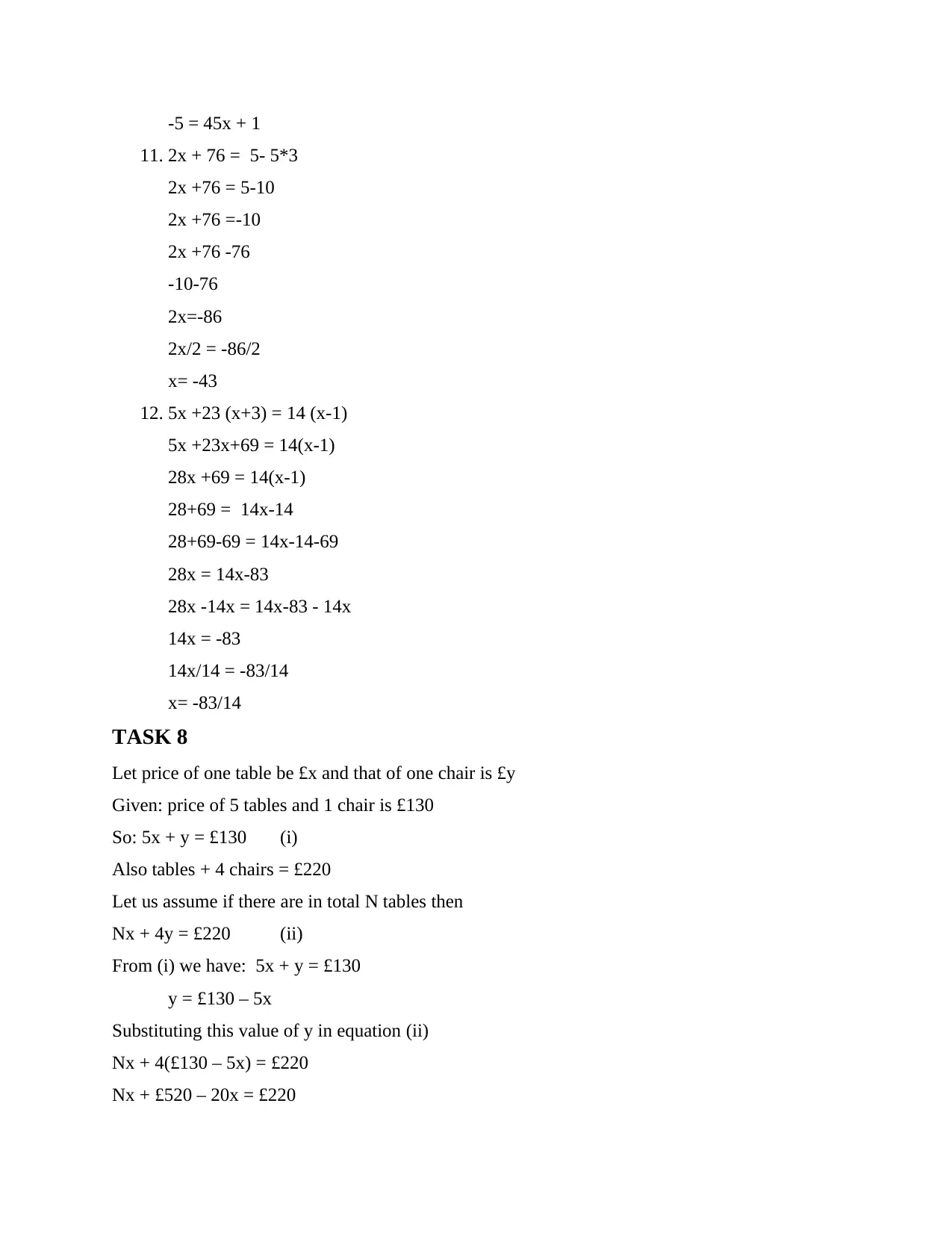
-5 = 45x + 1
11. 2x + 76 = 5- 5*3
2x +76 = 5-10
2x +76 =-10
2x +76 -76
-10-76
2x=-86
2x/2 = -86/2
x= -43
12. 5x +23 (x+3) = 14 (x-1)
5x +23x+69 = 14(x-1)
28x +69 = 14(x-1)
28+69 = 14x-14
28+69-69 = 14x-14-69
28x = 14x-83
28x -14x = 14x-83 - 14x
14x = -83
14x/14 = -83/14
x= -83/14
TASK 8
Let price of one table be £x and that of one chair is £y
Given: price of 5 tables and 1 chair is £130
So: 5x + y = £130 (i)
Also tables + 4 chairs = £220
Let us assume if there are in total N tables then
Nx + 4y = £220 (ii)
From (i) we have: 5x + y = £130
y = £130 – 5x
Substituting this value of y in equation (ii)
Nx + 4(£130 – 5x) = £220
Nx + £520 – 20x = £220
11. 2x + 76 = 5- 5*3
2x +76 = 5-10
2x +76 =-10
2x +76 -76
-10-76
2x=-86
2x/2 = -86/2
x= -43
12. 5x +23 (x+3) = 14 (x-1)
5x +23x+69 = 14(x-1)
28x +69 = 14(x-1)
28+69 = 14x-14
28+69-69 = 14x-14-69
28x = 14x-83
28x -14x = 14x-83 - 14x
14x = -83
14x/14 = -83/14
x= -83/14
TASK 8
Let price of one table be £x and that of one chair is £y
Given: price of 5 tables and 1 chair is £130
So: 5x + y = £130 (i)
Also tables + 4 chairs = £220
Let us assume if there are in total N tables then
Nx + 4y = £220 (ii)
From (i) we have: 5x + y = £130
y = £130 – 5x
Substituting this value of y in equation (ii)
Nx + 4(£130 – 5x) = £220
Nx + £520 – 20x = £220
⊘ This is a preview!⊘
Do you want full access?
Subscribe today to unlock all pages.

Trusted by 1+ million students worldwide
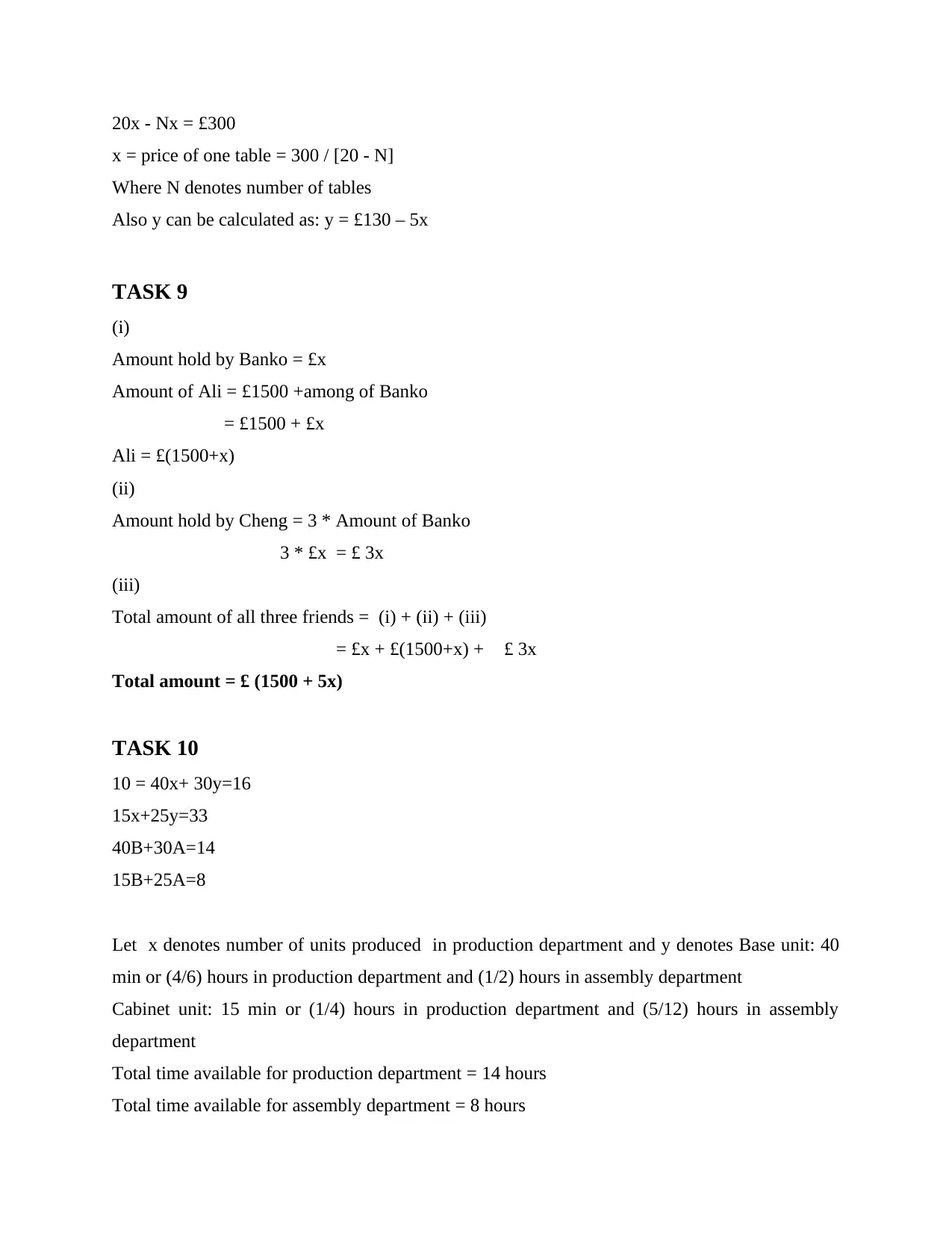
20x - Nx = £300
x = price of one table = 300 / [20 - N]
Where N denotes number of tables
Also y can be calculated as: y = £130 – 5x
TASK 9
(i)
Amount hold by Banko = £x
Amount of Ali = £1500 +among of Banko
= £1500 + £x
Ali = £(1500+x)
(ii)
Amount hold by Cheng = 3 * Amount of Banko
3 * £x = £ 3x
(iii)
Total amount of all three friends = (i) + (ii) + (iii)
= £x + £(1500+x) + £ 3x
Total amount = £ (1500 + 5x)
TASK 10
10 = 40x+ 30y=16
15x+25y=33
40B+30A=14
15B+25A=8
Let x denotes number of units produced in production department and y denotes Base unit: 40
min or (4/6) hours in production department and (1/2) hours in assembly department
Cabinet unit: 15 min or (1/4) hours in production department and (5/12) hours in assembly
department
Total time available for production department = 14 hours
Total time available for assembly department = 8 hours
x = price of one table = 300 / [20 - N]
Where N denotes number of tables
Also y can be calculated as: y = £130 – 5x
TASK 9
(i)
Amount hold by Banko = £x
Amount of Ali = £1500 +among of Banko
= £1500 + £x
Ali = £(1500+x)
(ii)
Amount hold by Cheng = 3 * Amount of Banko
3 * £x = £ 3x
(iii)
Total amount of all three friends = (i) + (ii) + (iii)
= £x + £(1500+x) + £ 3x
Total amount = £ (1500 + 5x)
TASK 10
10 = 40x+ 30y=16
15x+25y=33
40B+30A=14
15B+25A=8
Let x denotes number of units produced in production department and y denotes Base unit: 40
min or (4/6) hours in production department and (1/2) hours in assembly department
Cabinet unit: 15 min or (1/4) hours in production department and (5/12) hours in assembly
department
Total time available for production department = 14 hours
Total time available for assembly department = 8 hours
Paraphrase This Document
Need a fresh take? Get an instant paraphrase of this document with our AI Paraphraser
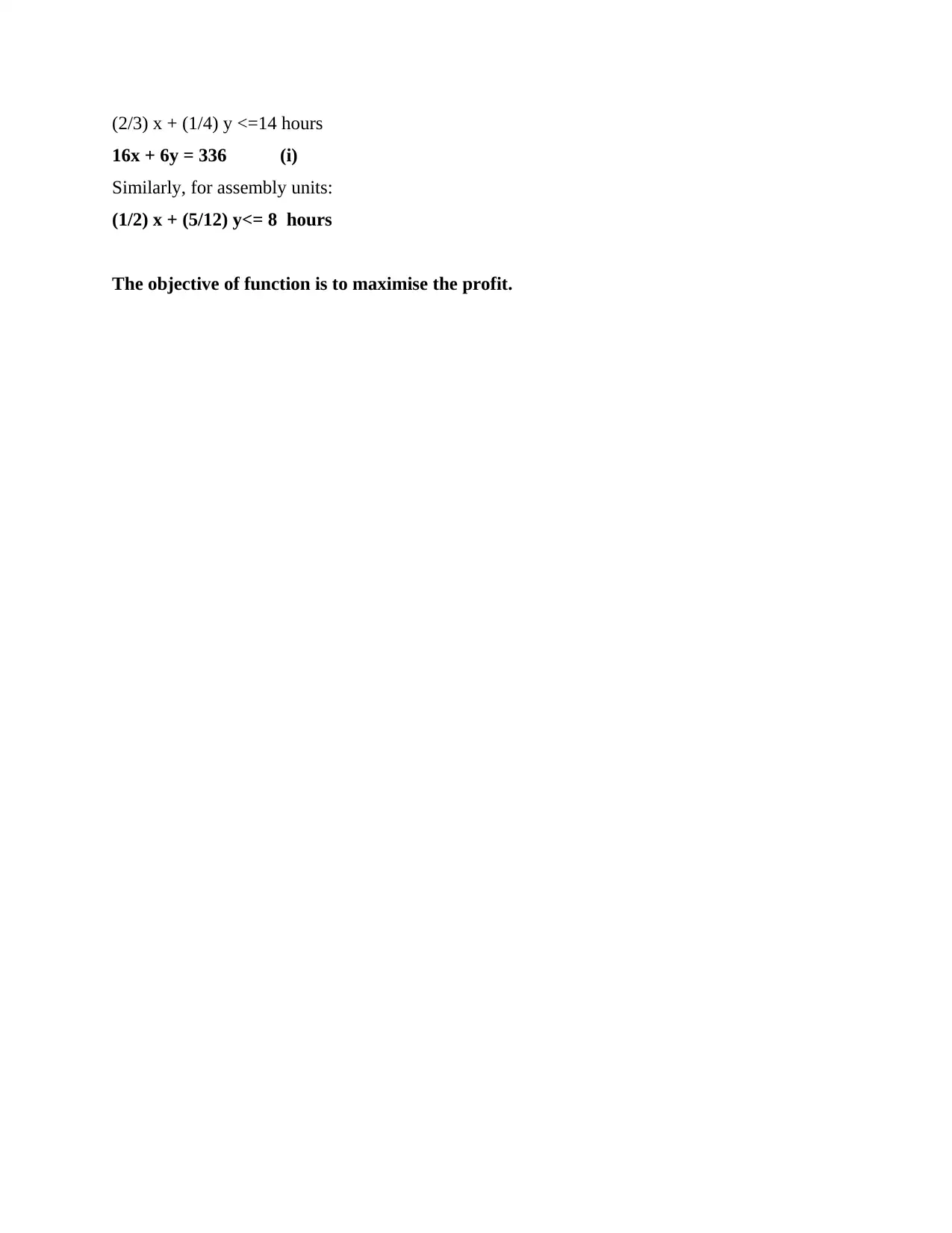
(2/3) x + (1/4) y <=14 hours
16x + 6y = 336 (i)
Similarly, for assembly units:
(1/2) x + (5/12) y<= 8 hours
The objective of function is to maximise the profit.
16x + 6y = 336 (i)
Similarly, for assembly units:
(1/2) x + (5/12) y<= 8 hours
The objective of function is to maximise the profit.

CONCLUSION
⊘ This is a preview!⊘
Do you want full access?
Subscribe today to unlock all pages.

Trusted by 1+ million students worldwide
1 out of 13
Related Documents
Your All-in-One AI-Powered Toolkit for Academic Success.
+13062052269
info@desklib.com
Available 24*7 on WhatsApp / Email
![[object Object]](/_next/static/media/star-bottom.7253800d.svg)
Unlock your academic potential
Copyright © 2020–2026 A2Z Services. All Rights Reserved. Developed and managed by ZUCOL.





